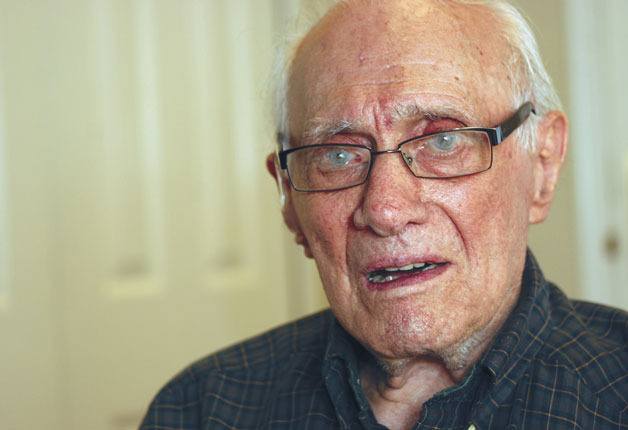FREELAND — Savy Savinelli has strong memories of the Flying Tigers.
“I dug myself a foxhole, and laid in it and watched them shoot down Zeroes,” he said.
Savinelli wasn’t narrating a grainy black-and-white movie about the China-Burma campaign in World War II, featuring the dog-fighting prowess of the legendary Flying Tigers against the Japanese air force.
He remembers the events of nearly 70 years ago in vivid color, because he was there.
“They used to get $600 for every Zero they shot down,” he said Monday.
Savinelli and his wife Katherine reside at Maple Ridge Assisted Living Community in Freeland. Earlier this month, he turned 99.
“He’s sort of an icon at Maple Ridge,” said community relations director Kris Barker. “He reminds me of somebody out of ‘The Godfather,’ with his rich Italian accent.”
Savinelli is one of the dwindling number of World War II veterans who served in China, Burma and India, regularly traveling the Burma Road over what came to be known as The Hump, bringing supplies and military expertise to help the people of the area in the battle against Japan.
Savinelli, whose first name is Achilles — “the Army changed it” — was a sergeant attached to the 21st Field Hospital motor pool when his unit took over a base near the small Chinese walled city of Paoshan in the Himalayan Mountains, where the Flying Tigers had been stationed.
“We traveled with them,” Savinelli said. “We went where they went.”
The Tigers, officially known as the 1st American Volunteer Group of the Chinese Air Force, was a civilian group formed by Claire Chennault to help the Chinese before the United States entered the war.
The unit’s 60 P-40 fighter aircraft, each with brightly painted shark’s teeth on the front fuselage, became the most distinctive of the war.
The unit’s first combat came 12 days after Pearl Harbor, and its exploits and claimed destruction of nearly 300 enemy aircraft in 1941 and 1942 gave Americans hope that the Japanese could be defeated.
The Flying Tigers were eventually replaced by the U.S. Army 23rd Fighter Group, and later absorbed by the 14th Air Force, commanded by Chennault, who was made a general.
Savinelli was 33 when he was drafted into the Army in his home town of Boston, Mass.
“I had a high number,” he said. “They took me. I was the old man of the outfit.”
After 32 days on a troop ship crammed with 10,000 other soldiers, he arrived in India, and eventually China. He spent his days on the Burma Road, running errands for officers. He said he lived off the land, cooking anything he caught on a charcoal fire in front of his tent.
“It’s a good thing I liked rice,” he said.
At one point, he also suffered from malaria, he added.
When the war was over, Savinelli was burned out. He returned to Boston, but it was too cold, so he went to California, where he spent an aimless year.
“I was dead. I didn’t want to do anything,” he said. “It took me a year to recuperate.”
He eventually went to work for Southern California Edison Co., the utility, altering the clocks on kitchen stoves to match new electrical specifications.
“That was right up my alley — they hired me right off the bat,” Savinelli said. “Clocks got me going again.”
So did the warm weather of California. He spent the next 68 years there, he said.
Savinelli said he worked for years in the clock business, and in various other jobs.
“I could have gone to college, but I was making too much money,” he said.
He married Katherine in 1979.
They moved to Maple Ridge about two years ago. Their daughter, Rosemarie Hecker, lives in Clinton.
“She’s the best thing we’ve ever done,” Savinelli said. “She takes care of us.”
As for the nation’s current conflicts, he said he’s perplexed.
“I can’t understand these wars today,” he said. “I think they’re playing politics.”
Through the years, Savinelli has tried to make contact with members of his World War II unit, without success.
“They disappeared,” he said. “I’ve never seen anybody from my outfit. But not many people went there.”
He still has his Army uniform, however — and it still fits.
“I’ve been the same weight all my life. I never went over 160,” Savinelli said. “I’m a very light eater. I’ve learned to live with very little. I had to.”
He said the secret to his longevity is probably genetic — his brother back in Boston is 103.
What’s next?
“Wait for 100,” he said.
It was dinner time at Maple Ridge.
“Let’s go, Katherine,” he said, and the pair gathered their walkers and headed for the elevator across the hall.
“He’s a good cook, but he hasn’t done much lately,” she said with a smile.

Savy Savinelli looks over the diary he kept during his Army service in World War II.
Brian Kelly/South Whidbey Record


